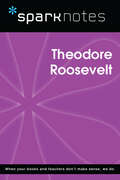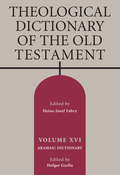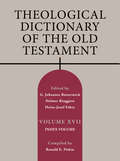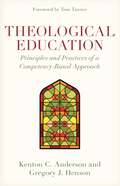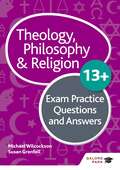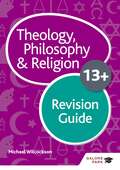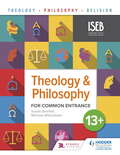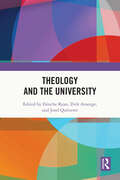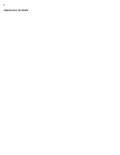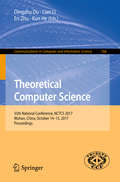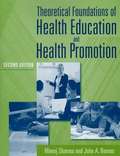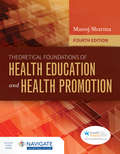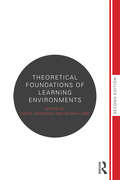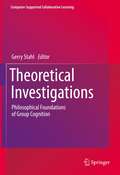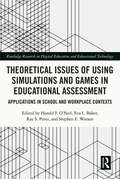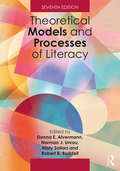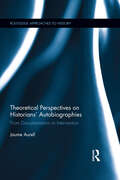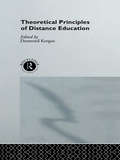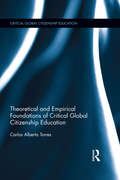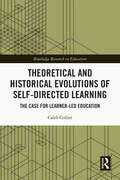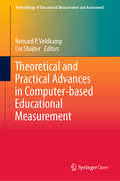- Table View
- List View
Theodore Roosevelt (SparkNotes Biography Guide)
by SparkNotesTheodore Roosevelt (SparkNotes Biography Guide) Making the reading experience fun! SparkNotes Biography Guides examine the lives of historical luminaries, from Alexander the Great to Virginia Woolf. Each biography guide includes:An examination of the historical context in which the person lived A summary of the person&’s life and achievements A glossary of important terms, people, and events An in-depth look at the key epochs in the person&’s career Study questions and essay topics A review test Suggestions for further reading Whether you&’re a student of history or just a student cramming for a history exam, SparkNotes Biography guides are a reliable, thorough, and readable resource.
Theological Dictionary of the Old Testament, Volume XVI (Theological Dictionary Of The Old Testament Ser. #11)
by G. Johannes Botterweck; Helmer Ringgren; Heinz-Josef FabryVolume XVI concludes the monumental, critically acclaimed Theological Dictionary of the Old Testament with an Aramaic dictionary.This latest and last TDOT volume incorporates nearly the complete lexicon of Biblical Aramaic as well as a major portion of the theologically, culturally, and historically relevant terms in other ancient Aramaic writings. Each article provides information on the term&’s meaning and usage, is fully annotated, and contains a bibliography with cross-references to the entire TDOT series.Further enhancing this volume are an introductory overview of the history of Aramaic and a comparative grammatical outline of ancient Aramaic at the end of the book.
Theological Dictionary of the Old Testament, Volume XVI (Theological Dictionary Of The Old Testament Ser. #14)
by G. Johannes Botterweck; Helmer Ringgren; Heinz-Josef FabryVolume XVI concludes the monumental, critically acclaimed Theological Dictionary of the Old Testament with an Aramaic dictionary.This latest and last TDOT volume incorporates nearly the complete lexicon of Biblical Aramaic as well as a major portion of the theologically, culturally, and historically relevant terms in other ancient Aramaic writings. Each article provides information on the term&’s meaning and usage, is fully annotated, and contains a bibliography with cross-references to the entire TDOT series.Further enhancing this volume are an introductory overview of the history of Aramaic and a comparative grammatical outline of ancient Aramaic at the end of the book.
Theological Dictionary of the Old Testament, Volume XVII: Index Volume (Theological Dictionary of the Old Testament)
by Ronald E. PitkinThis useful resource, which concludes the illustrious Theological Dictionary of the Old Testament, provides TDOT users with an index to all sixteen previous volumes. The first part of this volume indexes keywords in Hebrew, Aramaic, and English, while the second part indexes all textual references—both biblical and extrabiblical.
Theological Education: Principles and Practices of a Competency-Based Approach
by Kenton C. Anderson Gregory J. HensonTheological Education demonstrates how churches and seminaries can cooperate through a competency-based learning approach to ministry preparation--that is, competency-based theological education (CBTE). CBTE focuses on the mutual mission of the church and theological education: developing followers of Christ who flourish in their vocations. This first book-length treatment of CBTE lays the groundwork for expansion and refinement as theological schools and churches move together in partnership, exploring: - Principles that ground successful CBTE cooperation, such as collaborative mission, contextualized discipleship, and holistic assessment; and - Practices that a CBTE approach requires, such as affordable programs, flexible technology, and continuous improvement Using the CBTE model means seminaries can provide practical ministry training together with churches who invest in the theological education of those who minister among them.
Theology Philosophy and Religion 13+ Exam Practice Questions and Answers
by Michael Wilcockson Susan GrenfellThis book contains a wealth of exam-style questions to help students prepare for the 13+ Common Entrance exam in Theology, Philosophy and Religion. Tailored specifically to the latest syllabus, all question come with detailed advice and model answers that enable pupils to grow in confidence and achieve top marks.- Endorsed by ISEB- Covers all three question types that could appear in the exam- Contains model answers to all questions, saving time and helping to identify areas requiring further study- Includes the ISEB Common Entrance mark scheme
Theology Philosophy and Religion 13+ Exam Practice Questions and Answers
by Michael Wilcockson Susan GrenfellThis book contains a wealth of exam-style questions to help students prepare for the 13+ Common Entrance exam in Theology, Philosophy and Religion. Tailored specifically to the latest syllabus, all question come with detailed advice and model answers that enable pupils to grow in confidence and achieve top marks.- Endorsed by ISEB- Covers all three question types that could appear in the exam- Contains model answers to all questions, saving time and helping to identify areas requiring further study- Includes the ISEB Common Entrance mark scheme
Theology Philosophy and Religion for 13+ Revision Guide
by Michael WilcocksonThis indispensable revision guide is mapped precisely to the new Theology, Philosophy and Religion syllabus for 13+ Common Entrance, and provides students with a concise summary of everything they need to know for the latest exam beginning autumn 2019. Endorsed by ISEB, it covers all key content in an accessible format and includes test-yourself questions that embed knowledge as students work through the book.- Endorsed by ISEB- Summarises the key content for the new Theology, Philosophy and Religion syllabus replacing Religious Studies A- Guided activities and test-yourself questions enable pupils to recall knowledge and build exam-room confidence- Includes a handy glossary for easy reference throughout the book
Theology Philosophy and Religion for 13+ Revision Guide
by Michael WilcocksonThis indispensable revision guide is mapped precisely to the new Theology, Philosophy and Religion syllabus for 13+ Common Entrance, and provides students with a concise summary of everything they need to know for the latest exam beginning autumn 2019. Endorsed by ISEB, it covers all key content in an accessible format and includes test-yourself questions that embed knowledge as students work through the book.- Endorsed by ISEB- Summarises the key content for the new Theology, Philosophy and Religion syllabus replacing Religious Studies A- Guided activities and test-yourself questions enable pupils to recall knowledge and build exam-room confidence- Includes a handy glossary for easy reference throughout the book
Theology and Philosophy for Common Entrance 13+
by Michael Wilcockson Susan GrenfellTrust the experts; let Religious Studies specialists Susan Grenfell and Michael Wilcockson guide you through the new Theology and Philosophy content of the ISEB Theology, Philosophy and Religion syllabus for Common Entrance 13+.- Enables students to develop and review their knowledge through discussion points and a variety of activities designed to encourage active research and engagement- Builds the skills that students need for the exam by providing questions that focus on the three assessment objectives- Boosts students' confidence approaching assessment with exam-style practice questions at the end of each section- Guides you though the new - and potentially challenging - syllabus content with clear coverage of the philosophical and ethical materialThis Student Book is fully supported by the accompanying Teacher Resource Book, which contains helpful Teachers' Overviews for each chapter, guidance on delivering the content and classroom-ready worksheets.
Theology and Philosophy for Common Entrance 13+
by Michael Wilcockson Susan GrenfellTrust the experts; let Religious Studies specialists Susan Grenfell and Michael Wilcockson guide you through the new Theology and Philosophy content of the ISEB Theology, Philosophy and Religion syllabus for Common Entrance 13+.- Enables students to develop and review their knowledge through discussion points and a variety of activities designed to encourage active research and engagement- Builds the skills that students need for the exam by providing questions that focus on the three assessment objectives- Boosts students' confidence approaching assessment with exam-style practice questions at the end of each section- Guides you though the new - and potentially challenging - syllabus content with clear coverage of the philosophical and ethical materialThis Student Book is fully supported by the accompanying Teacher Resource Book, which contains helpful Teachers' Overviews for each chapter, guidance on delivering the content and classroom-ready worksheets.
Theology and the University
by Fáinche Ryan Dirk Ansorge Josef QuittererTheology and the University presents a compelling argument as to why theology still matters. It considers how theology has been marginalised in the academy and in public life, arguing that doing so has serious repercussions for the integrity of the academic study of religion.The chapters in this book demonstrate how theology, as the only discipline which represents religion from within, provides insight into aspects of religion which are hidden from the social sciences. Against a backdrop of heated debates on the role of the humanities in the university, the book highlights the specific contribution of theological education and research to the work of a university, providing essential information for academic and social/political decision-making. Whilst the book has an emphasis on the Catholic tradition, it explores the prospect of fruitful complementarity and interdisciplinarity both with secularised studies of religion, and other disciplines in the university, such as literature, philosophy, and the social sciences.This book provides orientation for decision-makers, particularly those concerned with the broader question of humanities in the university; students in their choice of study; those interested in the wellbeing of today’s universities; and ecclesial authorities seeking to form leaders capable of intelligent responses to the issues of contemporary society. It is a must read for all researchers of theology, as well as anyone interested in the role of the humanities more broadly.
Theology of Hope: On the Ground and the Implications of a Christian Eschatology (The Works of Jurgen Moltmann)
by Jurgen Moltmann James W. LeitchThe following efforts bear the title Theology of Hope, not because they set out once again to present eschatology as a separate doctrine and to compete with the well known textbooks. Rather, their aim is to show how theology can set out from hope and begin to consider its theme in an eschatological light. <p><p>For this reason they inquire into the ground of the hope of Christian faith and into the responsible exercise of this hope in thought and action in the world today. The various critical discussions should not be understood as rejections and condemnations. They are necessary conversations on a common subject which is so rich that it demands continual new approaches.
Theoretical Computer Science
by Lian Li Dingzhu Du En Zhu Kun HeThe satisfiability (SAT) problem is central in mathematical logic, computing theory, and many industrial applications. There has been a strong relationship between the theory, the algorithms, and the applications of the SAT problem. This book aims to bring together work by the best theorists, algorithmists, and practitioners working on the SAT problem and on industrial applications, as well as to enhance the interaction between the three research groups. The book features the application of theoretical/algorithmic results to practical problems and presents practical problems for theoretical/algorithmic study. Major topics covered in the book include practical and industrial SAT problems and benchmarks, significant case studies and applications of the SAT problem and SAT algorithms, new algorithms and improved techniques for satisfiability testing, specific data structures and implementation details of the SAT algorithms, and the theoretical study of the SAT problem and SAT algorithms. It features: a comprehensive review of SAT research work over the past 25 years; the most recent research results; and a spectrum of algorithmic issues and applications.
Theoretical Foundations of Health Education and Health Promotion
by John A. Romas Manoj SharmaTheoretical Foundations of Health Education and Health Promotion, Second Edition, introduces students to common theories from behavioral and social sciences that are currently being used in health education and promotion. Each discussion of theory is accompanied by a practical skill-building activity in the context of planning and evaluation and a set of application questions that will assist the student in mastering the application of the theory. With its accessible language, this text helps students grasp new theories easily and shows them how to use these theories effectively when designing programs in community, school, worksite, or patient care settings.
Theoretical Foundations of Health Education and Health Promotion
by Manoj SharmaA SHAPE America Endorsed Title! Abstract concepts and behavioral and social theories used in health education and promotion can be challenging for students to learn and comprehend. Theoretical Foundations of Health Education and Health Promotion, Fourth Edition provides a simple, pragmatic, easy-to-apply exposition to behavioral and social theories used in health education, health promotion, and public health. The Fourth Edition introduces students to common theories from behavioral and social sciences that are currently being used in health education and promotion. Each discussion of theory is accompanied by a practical skill-building activity in the context of planning and evaluation, along with a set of application questions that will assist the student in mastering the application of the theory. Theoretical Foundations of Health Education and Health Promotion is written to address the core competencies for health education specialists outlined by the National Commission for Heal
Theoretical Foundations of Learning Environments
by Susan Land David JonassenTheoretical Foundations of Learning Environments provides students, faculty, and instructional designers with a clear, concise introduction to the major pedagogical and psychological theories and their implications for the design of new learning environments for schools, universities, or corporations. Leading experts describe the most important contemporary theories that form the foundation of the conception and design of student-centered learning environments and new applications of educational technologies. This book is well suited as a textbook for courses in instructional design, educational psychology, learning theory, curriculum theory and design, and related areas. The rise of constructivism and its associated theories represented a paradigm shift for educators and instructional designers to a view of learning as necessarily more social, conversational, and constructive than traditional transmissive views of learning. This bestselling book was the first to provide a manageable overview of the altered field, and the second edition has been fully updated to include expert introductions to Metacognition, Argumentation, and other key contemporary theories.
Theoretical Investigations: Philosophical Foundations of Group Cognition (Computer-Supported Collaborative Learning Series #18)
by Gerry StahlComputers have transformed how we think, discuss and learn—as individuals, in groups, within cultures and globally. However, social media are problematic, fostering flaming, culture wars and fake news. This volume presents an alternative paradigm for computer support of group thinking, collaborative learning and joint knowledge construction. This requires expanding concepts of cognition to collectivities, like collaborative groups of networked students. Theoretical Investigations explores the conditions for group cognition, supplying a philosophical foundation for new models of pedagogy and methods to analyze group interaction. Twenty-five self-contained investigations document progress in research on computer-supported collaborative learning (CSCL)—both in Stahl’s own research and during the first decade of the CSCL journal.The volume begins with two new reflections on the vision and theory that result from this research. Representing both ethnomethodological and social-constructivist research paradigms, the investigations within this volume comprise a selection of seminal and influential articles and critical commentaries that contribute to an understanding of concepts and themes central to the CSCL field. The book elaborates an innovative theory of group cognition and substantiates the pedagogical potential of CSCL. Theoretical Investigations: Philosophical Foundations of Group Cognition is essential as a graduate text for courses in educational theory, instructional design, learning and networked technologies. The investigations will also appeal to researchers and practitioners in those areas.
Theoretical Issues of Using Simulations and Games in Educational Assessment: Applications in School and Workplace Contexts (Routledge Research in Digital Education and Educational Technology)
by Harold F. O'NeilPresenting original studies and rich conceptual analyses, this volume reports on theoretical issues involved in the use of simulations and games in educational assessment. Chapters consider how technologies can be used to effectively assess, modify, and enhance learning and assessment in education and training. By highlighting theoretical issues arising from the use of games and simulations as assessment tools for selection and classification, training, and evaluation across educational and workplace contexts, the volume offers both broad conceptual views on assessment, as well as rich descriptions of various, context-specific applications. Through a focus that includes both quantitative and qualitative approaches, policy implications, meta-analysis, and constructs, the volume highlights commonalities and divergence in theoretical research being conducted in relation to K-12, post-secondary, and military education and assessment. In doing so, the collection enhances understanding of how games and simulations can intersect with the science of learning to improve educational outcomes. Given its rigorous and multidisciplinary approach, this book will prove an indispensable resource for researchers and scholars in the fields of educational assessment and evaluation, educational technology, military psychology, and educational psychology.
Theoretical Models and Processes of Literacy
by Donna E. Alvermann Norman J. Unrau Misty Sailors Robert B. RuddellThe Seventh Edition of this foundational text represents the most comprehensive source available for connecting multiple and diverse theories to literacy research, broadly defined, and features both cutting-edge and classic contributions from top scholars. Two decades into the 21st century, the Seventh Edition finds itself at a crossroads and differs from its predecessors in three major ways: the more encompassing term literacy replaces reading in the title to reflect sweeping changes in how readers and writers communicate in a digital era; the focus is on conceptual essays rather than a mix of essays and research reports in earlier volumes; and most notably, contemporary literacy models and processes enhance and extend earlier theories of reading and writing. Providing a tapestry of models and theories that have informed literacy research and instruction over the years, this volume’s strong historical grounding serves as a springboard from which new perspectives are presented. The chapters in this volume have been selected to inspire the interrogation of literacy theory and to foster its further evolution. This edition is a landmark volume in which dynamic, dialogic, and generative relations of power speak directly to the present generation of literacy theorists and researchers without losing the historical contexts that preceded them. Some additional archival essays from previous editions are available on the book’s eResource. New to the Seventh Edition: Features chapters on emerging and contemporary theories that connect directly to issues of power and contrasts new models against more established counterparts. New chapters reflect sweeping changes in how readers and writers communicate in a digital era. Slimmer volume is complemented by some chapters from previous editions available online.
Theoretical Perspectives on Historians' Autobiographies: From Documentation to Intervention (Routledge Approaches to History #15)
by Jaume AurellE. H. Carr wrote, "study the historian before you begin to study the facts." This book approaches the life, work, ideas, debates, and the context of key 20th- and 21st-century historians through an analysis of their life writing projects viewed as historiographical sources. Merging literary studies on autobiography with theories of history, it provides a systematic and detailed analysis of the autobiographies of the most outstanding historians, from the classic texts by Giambattista Vico, Edward Gibbon and Henry Adams, to the Annales historians such as Fernand Braudel, Philippe Ariès and Georges Duby, to Marxist historians such as Eric Hobsbawm and Annie Kriegel, to postmodern historians such as Carolyn Steedman, Robert A. Rosenstone, Carlos Eire, Luisa Passerini, Elisabeth Roudinesco, Gerda Lerner and Sheila Fitzpatrick, and to "interventional" historians such as Geoff Eley, Jill Ker Conway, Natalie Davis and Gabrielle Spiegel. Using a comparative approach to these texts, this book identifies six historical-autobiographical styles: humanistic, biographic, ego-historical, monographic, postmodern, and interventional. By privileging historians' autobiographies, this book proposes a renewed history of historiography, one that engages the theoretical evolution of the discipline, the way history has been interpreted by historians, and the currents of thought and ideologies that have dominated and influenced its writing in the 20th and 21st centuries.
Theoretical Principles of Distance Education (Routledge Studies in Distance Education)
by Desmond KeeganAccording to UNESCO statistics, 10 million of the world's 600 million students study at a distance. Theoretical Principles of Distance Education seeks to lay solid foundations for the education of these students and for the structures within which they study. As a more industrialised form of education provision, distance education is well adapted to the use of new communication technologies, and brings to education many of the strengths and dangers of post-industrialism. The central focus of the study of distance education is the placing of the student at home or at work and the justification of the abandonment in this form of education of interpersonal, face-to-face communication, previously considered to be a cultural imperative for education in both east and west. This book explores the problems that distance education poses to the theorist, bringing together an international team of distance educators to address these issues for the first time in a systematic way. The team comprises theoreticians, administrators, experts in educational technology and adult education, experts in learning from video machines, from computers and other forms of technology. Contributions from Italy, and Scandinavia contrast with viewpoints provided by scholars from the US, Canada, Australia, and the UK.
Theoretical and Empirical Foundations of Critical Global Citizenship Education (Critical Global Citizenship Education)
by Carlos Alberto TorresIn the first volume in the Critical Global Citizenship Education series, Torres combines theoretical and empirical research to present an original perspective on global citizenship education as a vitally important way of learning in a globalized world. In examining the requirements for effective global citizenship education and education reform, he investigates pathways to citizenship-building at the local, national and global levels and urges development of teaching methods, teacher education, and curriculum within a social justice education framework. Taking into account post-colonial perspectives, political realities at play, and practical implications, Torres provides a succinct but comprehensive understanding of how global citizenship education can expand the concept of civic education in a global society and interrupt inequality. This volume considers the ways that global citizenship education has been incorporated and is used by international institutions, governments, and the academy, and provides a clear framework for anyone struggling to make sense of the tensions and complexities of global citizenship education today.
Theoretical and Historical Evolutions of Self-Directed Learning: The Case for Learner-Led Education (Routledge Research in Education)
by Caleb CollierThis book analyzes the deep historical and theoretical roots of self-directed learning models in order to put forward a new conceptual understanding of self-directed learning. It utilizes philosophical methods to present arguments, both historical and contemporary, in favor of shifting education toward self-directed models and away from a view of education that places teachers, administration, curriculum, and standards at the center of the learning endeavor. This book demonstrates that self-directed learning has proven to be effective in numerous contexts and builds on this history to present a new philosophy of education termed "Eudemonic Self-Directed Learning," for individual and societal flourishing. Exploring exemplars from different cultural and historical settings to inform post-pandemic pedagogies and policies, this book will appeal to scholars and researchers of the history and philosophy of education, with interests in self-directed learning and its potential for contemporary practice.
Theoretical and Practical Advances in Computer-based Educational Measurement (Methodology of Educational Measurement and Assessment)
by Bernard P. Veldkamp Cor SluijterThis open access book presents a large number of innovations in the world of operational testing. It brings together different but related areas and provides insight in their possibilities, their advantages and drawbacks. The book not only addresses improvements in the quality of educational measurement, innovations in (inter)national large scale assessments, but also several advances in psychometrics and improvements in computerized adaptive testing, and it also offers examples on the impact of new technology in assessment. Due to its nature, the book will appeal to a broad audience within the educational measurement community. It contributes to both theoretical knowledge and also pays attention to practical implementation of innovations in testing technology.
